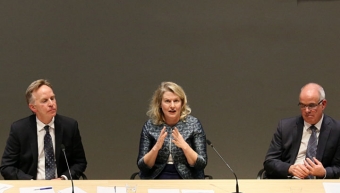Yesterday, the third in a series of four ICTY Legacy Lectures was held at Leiden University’s Hague campus. The discussion panel, entitled “The Story of the ICTY Office of the Prosecutor (OTP): Starting from Scratch - What We've Learned from 20 Years of OTP Investigations and Prosecutions”, provided a unique opportunity to learn about the work of the OTP directly from its investigators, analysts and lawyers.
Following an introduction by Professor Carsten Stahn, Programme Director of the Grotius Centre for International Legal Studies, Ms Michelle Jarvis, Deputy to the Prosecutor, delivered some opening remarks. The ensuing panel discussion was moderated by Senior Appeals Counsel Mr Douglas Stringer, and featured four OTP staff members: Mr Bob Reid, Chief of Operations, Mr Peter McCloskey, Senior Trial Attorney, Ms Dorothea Hanson, Analyst, and Ms Laurel Baig, Senior Appeals Counsel.
Ms Jarvis noted that the OTP was “built from the ground up in the situation where there were no precedents and no straightforward answers” and that, in order to “make the impossible possible, the OTP needed bold moves, sheer persistence and adaptability”. Next, Mr Stringer spoke about some of the initial challenges faced by the OTP at the beginning in answering questions such as "Where are the bodies? As thousands were missing. Where are the witnesses? As thousands had been displaced themselves through ethnic cleansing." He noted that other challenges included the need to learn about constitutional and military structures in order to prosecute leadership cases, and the difficulties involved in proving crimes that had never previously been prosecuted before an international criminal tribunal.
The first panellist, Mr Reid, who joined the OTP in 1994 as the first Investigation Team Leader, spoke about overcoming initial operational challenges in the investigation of war crimes cases. “We went where the evidence took us”, he said speaking about how the OTP chose its investigations and raised the first indictments. Mr Reid also spoke about crime sites investigations and pattern investigations, search and seizure missions, and the apprehension of fugitives. Mr McCloskey, who has prosecuted several cases relating to the events in Srebrenica, gave an example of the process of developing of a summons “to interview witnesses and suspects in order to obtain inside evidence of crimes from those who committed the crimes or were witnesses to those crimes, and admissions from people involved”.
Speaking about the importance of analysts in investigations and prosecutions, Ms Hanson noted that the OTP utilised three kinds of analysis: criminal analysis attached to investigation teams; military intelligence analysts in the Military Analysis Team (MAT); and research officers grouped in the "Leadership Research Team" (LRT). Several members of LRT and MAT, including Ms Hanson, presented their research and analysis as in-house expert witnesses testifying in leadership cases.
In relation to appeals proceedings at the ICTY, Ms Baig touched on four themes that emerged from the Tribunal’s first case, Prosecutor v. Duško Tadić, “that can be traced through the work of the Tribunal to the present day”: "the gradual articulation of the crime against humanity of persecution as the quintessential crime of the Balkan conflict; joint criminal enterprise as a mode of criminal responsibility; commitment to prosecuting sexual violence crimes; and the translation of the laws of war into international criminal law norms."
The ICTY Legacy Lectures are organised in cooperation with the Grotius Centre for International Legal Studies, with each lecture telling the story of a different organ of the Tribunal and the Defence. The lectures form part of the on-going ICTY Legacy Dialogues series of legacy and closing events. The final lecture in the series, entitled “The Story of ICTY Chambers: Behind the scenes insights into trial and appeal proceedings”, will be held on 16 November 2017 and feature representatives of ICTY Chambers.


